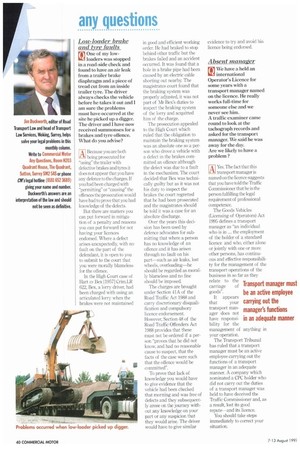any questions
Page 42

If you've noticed an error in this article please click here to report it so we can fix it.
Jim Duckworth, editor of Road Transport Law and head of Transport Law Services, Woking, Surrey, helps solve your legal problems in this monthly column. Write to Commercial Motor Any Questions, Room H203 Quadrant House, The Quadrant, Sutton, Surrey SM2 5AS or phone CM's legal hotline (0181 652 3689) giving your name and number. Duckworth's answers are an interpretation of the law and should not be seen as definitive.
Low-loader brake and tyre faults
One of my low loaders was stopped in a road-side check and found to have an air leak from a trailer brake diaphragm and a piece of tread cut from an inside trailer tyre. The driver always checks the vehicle before he takes it out and! am sure the problems must have occurred at the site he picked up a digger. The driver and I have now received summonses for a brakes and tyre offence. What do you advise?
A Because you are both
being prosecuted for 'using" the trailer with defective brakes and tyres it d(ies not appear that you have any defence to the charges. If you had been charged with "permitting" or "causing" the offences the prosecution would have had to prove that you had knowledge of the defects.
But there are matters you can put forward in mitigation of a penalty and reasons you can put forward for not having your licences endorsed. Where a defect arises unexpectedly, with no fault on the part of the defendant, it is open to you to submit to the court that you were morally blameless for the offence.
In the High Court case of Hart us Bex 11957] Crim.LR 622, Hex, a lorry driver, had been charged with using an articulated lorry when the brakes were not maintained in good and efficient working order. He had braked to stop behind other traffic but the brakes failed and an accident occurred. It was found that a hole in a brake pipe had been caused by an electric cable shorting out nearby. The magistrates court found that the braking system was properly adjusted, it was not part of Mr Hex's duties to inspect the braking system of the lorry and acquitted him of the charge.
The prosecution appealed to the High Court which ruled that the obligation to maintain the braking system was an absolute one so a person who drove a vehicle with a defect in the brakes committed an offence although the defect was due to a fault in the mechanism. The court decided that Hex was technically guilty but as it was not his duty to inspect the brakes the court regretted that he had been prosecuted and the magistrates should be told it was a case for an absolute discharge.
Over the years this decision has been used by defence advocates for submitting that where a person has no knowledge of an offence and it has arisen through no fault on his part—such as air leaks, lost wheels, overloading—he should be regarded as morally blameless and no fine should be imposed.
The charges are brought under Section 41A of the Road Traffic Act 1988 and carry discretionary disqualification and compulsory licence endorsement. However, Section 48 of the Road Traffic Offenders Act 1988 provides that these must not be ordered if a person "proves that he did not know, and had no reasonable cause to suspect, that the facts of the case were such that the offence would be committed".
To prove that lack of knowledge you would have to give evidence that the vehicle had been checked that morning and was free of defects and they subsequently arose on the journey without any knowledge on your part or any suspicion that they would arise. The driver would have to give similar evidence to try and avoid his licence being endorsed.




































































































